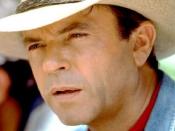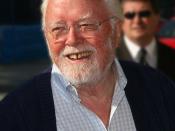Many times in literature, a character may remind the reader of a character of another work of literature or someone famous. When this piece of literature is translated to a film, the character's representation may change entirely. A wonderful example of this representation is Michael Crichton's Jurassic Park. In this work, the character John Hammond portrays a greedy, arrogant, and pompous old man with a dream to build a park full of cloned dinosaurs using DNA found in preserved mosquitoes. Hammond's character changes severely from the novel to the film and has a major impact on the overall story. In the film, Hammond is portrayed as a jolly old man with only two wishes: to do something that has never been done and please children. John Hammond's change from a insatiable old man to a jolly, grandfatherly entertainer is a major transformation and has a huge effect on the theme.
In the novel, Crichton portrays his character, Hammond, as a guy with a dream at first. With the development of the story also comes the development of Hammond's character. The reader begins to see Hammond's evil side. Hammond becomes a greedy man who wishes to play god through bio-technology and cloning. Hammond supports this argument when he stated, "Face the damn facts, Henry ... This isn't America. This isn't even Costa Rica. This is my island. I own it. And nothing is going to stop me from opening Jurassic Park to all the children of the world ... Or, at least, to the rich ones."
Hammond desires to have control over the dinosaurs no matter what the cost ends up being. The selfishness of Hammond's character also led to stubbornness. This stubbornness would not allow Hammond to foresee the consequences of his island, but rather only allows him...


